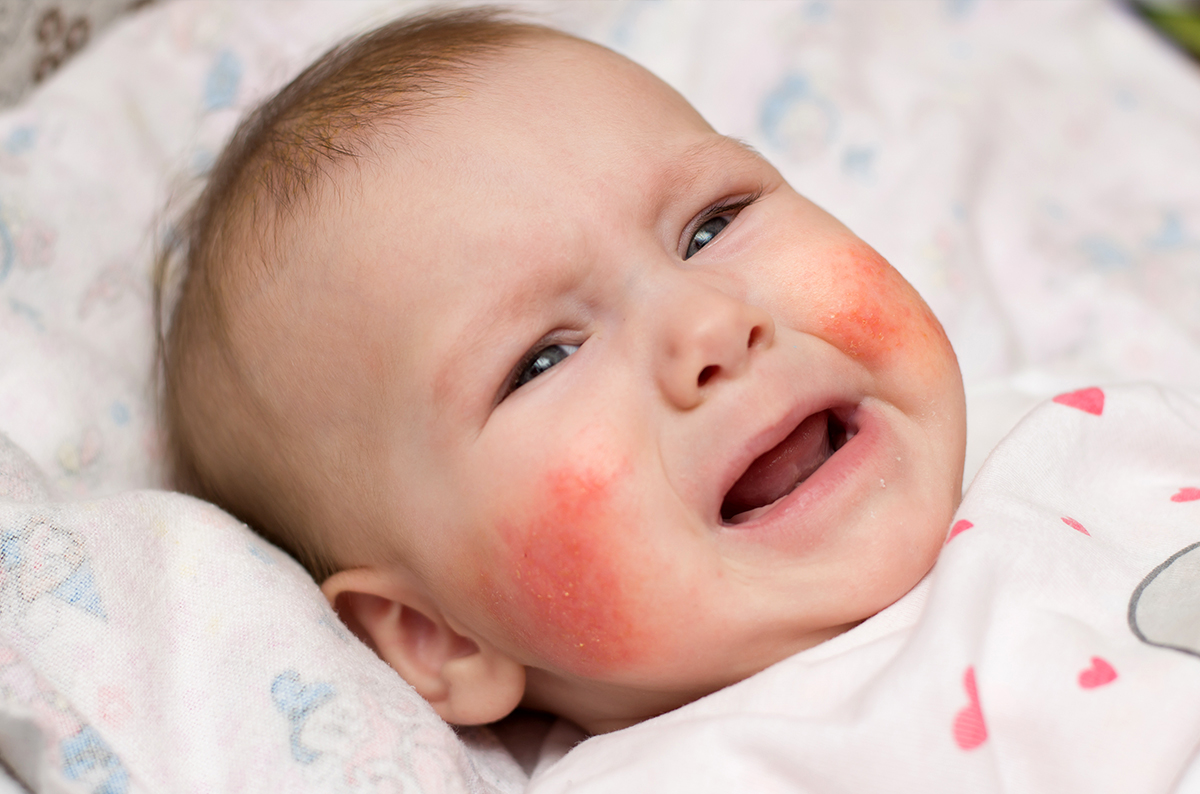Project Description
ECZEMA / DERMATITIS
Learn about Eczema and how Knoxville Institute of Dermatology can help you.
The Providers at Knoxville Institute of Dermatology are experts in the diagnosis and treatment of eczema. Eczema, often referred to as dermatitis or atopic dermatitis, is the name for a group of conditions that cause the skin to become inflamed, red and itchy. Children often develop atopic dermatitis with patches appearing on the scalp, forehead and cheeks. It is important to understand the type of eczema as well as the triggers to formulate the best treatment plan in both children and adults. Contact our office for an evaluation if you or your child are struggling with eczema.
What is dermatitis?
Dermatitis refers to a group of inflammatory conditions. It affects the outer layer of the skin, the epidermis. Dermatitis affects about one in every five people at some time in their lives. It results from a variety of different causes and has various patterns. The terms dermatitis and eczema are often used interchangeably. In some cases the term eczematous dermatitis is used. Dermatitis can be acute or chronic or both.
- Acute eczema (or dermatitis) refers to a rapidly evolving red rash which may be blistered and swollen.
- Chronic eczema (or dermatitis) refers to a longstanding irritable area. It is often darker than the surrounding skin, thickened (lichenified) and much scratched.
An in-between state is known as subacute eczema. Psychological stresses can provoke or aggravate dermatitis, presumably by suppressing normal immune mechanisms.
What types of dermatitis are there?
- Atopic dermatitis is particularly prevalent in children; inherited factors seem important, as there is nearly always a family history of dermatitis or asthma.
- Irritant contact dermatitis is provoked by handling water, detergents, solvents or harsh chemicals, and by friction. Irritants cause more trouble in those who have a tendency to atopic dermatitis.
- Allergic contact dermatitis is due to skin contact with substances that most people don’t react to: most commonly nickel, perfume, rubber, hair dye or preservatives. A dermatologist my identify the responsible agent by patch testing.
- Dry skin: especially on the lower legs, may cause asteatotic dermatitis, also called eczema craquele.
- Nummular dermatitis (also called ‘discoid eczema’) may be set off initially by an injury to the skin: scattered coin-shaped irritable patches persist for a few months.
- Seborrheic dermatitis and dandruff are due to irritation from toxic substances produced by malassezia yeasts that live on the scalp, face and sometimes elsewhere.
- Infective dermatitis seems to be provoked by impetigo (bacterial infection) or fungal infection.
- Stasis dermatitis arises on the lower legs of the elderly, due to swelling and poorly functioning leg veins.
What are treatments for dermatitis?
An important aspect of treatment is to identify and tackle any contributing factors (see above).
- Bathing Bathe using lukewarm water. Replace standard soap with a substitute such as a mild detergent soap-free cleanser: your dermatologist can advise you.
- Clothing Wear soft smooth cool clothes; coarse fibers (wool or synthetic) are best avoided (microfine merino wool may be suitable)
- Irritants Protect your skin from dust, water, solvents, detergents, injury.
- Emollients Apply an emollient liberally and often, particularly after bathing, and when itchy. Ask your doctor or dermatologist to recommend some to try; avoid perfumed products when possible.
- Topical steroids Apply a topical steroid cream or ointment to the itchy patches for a 5 to 15 day course. A suitable one will be prescribed by your doctor or dermatologist. Make sure you understand when and where to apply it, and how often you may repeat the course. Steroids should usually be applied once or twice daily to the red and itchy areas only. Sometimes two or more topical steroids will be supplied, either for different parts of the body, or for differing grades of dermatitis.
- Antibiotics Your doctor may recommend antibiotics if infection is complicating or causing the dermatitis. The infection is most often with Staphylococcus aureus or Streptococcus pyogenes.
- Antihistamines Antihistamine tablets may help reduce the itch, and are particularly useful at night.
- Other treatments Systemic treatments and phototherapy may also be recommended for severe cases.
What is the best long-term control?
Dermatitis is often a long-term problem. When you notice your skin getting dry, moisturize your skin again and carefully avoid the use of soap. If the itchy rash returns, use both the moisturizer and the steroid cream or ointment. If it fails to improve within two weeks, see your doctor for further advice.
WHAT OUR PATIENTS SAY
I have already recommended Dr Raman to a friend. The timeliness getting an appointment, the Covid safe setting, the efficiency of the staff along with the expertise of the doctor are reasons I will return and refer.
I had a recurring dermatological condition for several and a series of dermatologists as a result. And yet until I met Dr. Wright, my condition remained undiagnosed and it turned out to be potentially life-threatening. I am so fortunate to have found him and I would not go to anyone else and recommend him often.
Timely, professional, thorough and took the time to explain the procedure being done and options for upcoming needed procedure. Steps were taken to protect employees and patients against Covid challenges. I had basil cell removed three times and in different states. This office is the best hands down.
This office is very clean, professional and I never have to wait excessive time for my appointment. Dr. Rahman is so thorough and caring and kind. I have had Mohs surgery with Dr. Wright on my face and you cannot even see where the scar is. This is the place to go for your dermatology needs.
I’ll be 77 years old in a month and this was my first real skin check-up. I sort of had one a few years ago at a different place but was turned off by their emphasis on selling cosmetic treatments when I wanted to know about skin disease. Dr. Bakke and his assistant seemed to give me a thorough check, burned off some spots, took.a few biopsies, and I was good to go.
Everyone is so nice and friendly…the office staff is caring, professional and an asset to your institution. Even though I’ve been going to your office for a few years this is the first time I saw Kegan Reilly. He was very professional and very knowledgeable. He explained everything to me in detail and made me very comfortable in an uncomfortable situation. I highly recommend him for anyone who needs to see a dermatologist. He is definitely an exceptional medical provider.
I will be forever grateful to Dr. Anderson for her careful skin exam and detection of the start of a melanoma on my arm. She is pleasant, professional, and kind– everything you would want in a dermatologist.
Dr. Anderson and her staff are excellent. I have been a client for several years. I have received the best care. Dr. Anderson is excellent in discovering and treating. problems. Dr. Anderson listens and is honest.
The whole experience was a positive one… getting an appointment to see someone relatively soon, receiving several reminders, the (covid) health protections at the office, and the very pleasant and knowledgeable care of Lindsey Best FNP, at my appointment.
Sent email & text to inform of arrival procedures, took proper covid-19 protocol to ensure my safety and that of staff and other patients. Doctor and nurse took time to explain what would happen during visit and answered all questions. Explained proper home care of procedure site, made sure I knew how and informed to call office if any problems or questions. Everyone was very helpful, friendly and professional.
Contact Provider via Patient Portal
To access your portal, type kid.ema.md into a Mozilla Firefox browser. Your username will be your personal email address that needs to be provided to the front desk staff. A link will be sent to that [...]
Welcome Nathan Bowers, MD, PhD
Nathan Bowers began his training by earning a PhD in Immunology at the University of Alabama at Birmingham. Driven by a lifelong desire to care for patients in a clinical setting, he then [...]
New Location: Morristown!
Knoxville Institute of Dermatology is excited to announce our newest location in Morristown! We will be located in the Baptist Eye Surgeons building and seeing patients starting in January 2023. Call our office today [...]
Updated COVID-19 Guidelines
Thank you for your continued patience and understanding as we have taken the progressive steps to keeping our practice open for all of your dermatological needs during these unprecedented times. As always, the health [...]
World Psoriasis Day
It's almost October 29th and our physicians and staff are PSO excited to celebrate World Psoriasis Day! World Psoriasis Day is a campaign held annually on October 29th aiming to bring awareness to this [...]
October is Breast Cancer Awareness Month
October is Breast Cancer Awareness month. This annual month-long campaign is designed to bring awareness to one of the most common cancers, aside from skin cancer, in women. Each year in the United States, more [...]









